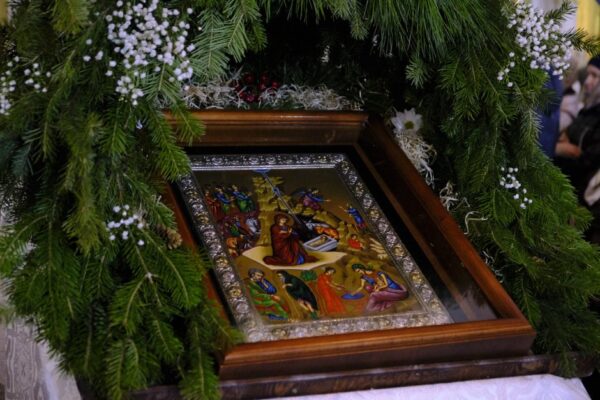MERRY CHRISTMAS
(Monday, December 25)
“God shall come from Teman (the South), and the Holy One from the shady mount Paran (ἐξ ὄρους κατασκίου δασέος, из горы приосененныя чащи).” (Habbakuk/Avvakum 3:3, LXX)
Why does this mystifying verse occur frequently throughout our church-services for Christmas? It’s from the “song” of the Prophet Habbakuk, which forms the basis for the 4th Ode of the Byzantine “canon” chanted at Matins, and is understood in the Tradition to be a prophecy about the Virgin Birth of our Lord in Bethlehem. It’s impossible to understand, if you don’t look into it especially, so I thought we’d do that, this Christmas morning. Don’t groan, you’ll thank me later. 
The term “Teman” (Greek: Θαιμαν, Hebrew: תימן), among its various meanings, was used in Biblical Hebrew also in the sense of “the South.” This is how the term is translated in the Old Slavonic: Бог «от юга» приидет… (God shall come from “the South”). The Prophet Habbakuk is presumed to have lived in Jerusalem at the time of his prophecy, although his home is not identified in the Bible. Bethlehem lies about ten kilometers *south* of Jerusalem, hence we recognize here a prophecy about the birth of Christ. At other times, God has revealed Himself from “the South” in the sense of Mount Sinai, which lies to the South of Israel.
The next part of the verse is more difficult to unpack, and its translations into English are many and varied. Before looking at the term “shady mount(ain),” which (spoiler alert) means the Holy Virgin, let’s look first at the term “Paran,” translated in the Greek Septuagint-translation as “δασύ” that means “bushy country” (or an area with a thick forest, hence the Slavonic translation, «чаща» that means a thick forest). The Hebrew etymology of the word “Paran” is more interesting. In the form of a verb פאר (pa’ar) it means “to glorify; to branch out in glory and beauty; the branching out or diversifying into a spectrum of glorious nuances.”
The “shady” or “overshadowed” mountain Paran (as indicated above, one branching out in glory and beauty) is the Holy Virgin, who is an elevated place, like a mountain, and “overshadowed” in the sense that shadows in the Bible often symbolize God’s presence and character. The Theotokos is seen to be “overshadowed” by God’s presence, as the Archangel says to her, “The Holy Spirit will come upon you, and the power of the Highest will *overshadow* you.” (Lk 1:35) She is identified as this “overshadowed” mountain with “thick forest” in Heirmos 4 of the first Christmas canon at the matins-service of this feast: “Stem and flower of the root of Jesse, You have blossomed from the Virgin, O Christ. From the overshadowed mountain of thick forest, You are come, made flesh from her than knew no man…” Let’s note also that she is identified with the “mountain” in Nebuchadnezzar’s dream, from which a stone is cut “without hands.” (Dan 2:45)
Today the Virgin gives birth to the Transcendent One! Thank you, Theotokos! Thank You, Lord! Merry Christmas, my beloved friends!






